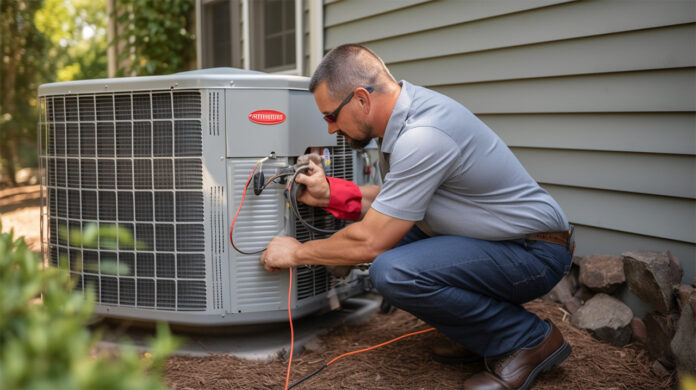A heat pump is a versatile and energy-efficient HVAC system that provides both heating and cooling for your home. To ensure that your heat pump continues to operate at its best and serves you well throughout the year, regular maintenance is crucial. In this article, we’ll provide you with a comprehensive list of heat pump maintenance tips to help you maintain its efficiency and extend its lifespan. If your looking for a new heat pump, checkout the latest pricing here.
Regular Cleaning
Clean or replace air filters every 1-3 months, as dirty filters can reduce airflow and strain the system.
Keep the outdoor unit free from debris, leaves, and vegetation that could obstruct airflow.
Inspect the Thermostat
Verify that the thermostat is functioning correctly, maintaining accurate temperature settings, and calibrating it if necessary.
Check for Refrigerant Leaks
Inspect the refrigerant lines for leaks. If you notice any refrigerant leakage, contact a professional technician for repairs.
Lubricate Moving Parts
Ensure that all moving parts are well-lubricated to reduce friction and wear. Refer to the manufacturer’s guidelines for specific lubrication points.
Inspect Electrical Connections
Regularly check the electrical connections, ensuring they are tight and secure. Loose connections can lead to system inefficiency and potentially dangerous situations.
Clean the Coils
Clean both the indoor evaporator and outdoor condenser coils annually to remove dirt and debris, which can reduce heat transfer efficiency.
Condensate Drain Maintenance
Clear the condensate drain line to prevent clogs and potential water damage. Ensure proper drainage away from the unit.
Inspect and Clean the Fan Blades
Check the condition of the fan blades and clean them as needed. Bent or dirty fan blades can impair airflow and system efficiency.
Monitor Defrost Cycle:
In cold weather, ensure that the defrost cycle is functioning correctly. A malfunctioning defrost cycle can lead to ice buildup on the outdoor unit.
Calibrate Sensors and Controls
Periodically calibrate sensors and controls to ensure accurate temperature readings and efficient operation.
Check for Unusual Noises:
Listen for unusual noises during operation, such as grinding, squealing, or rattling. These may indicate underlying issues that require attention.
Schedule Professional Maintenance:
Arrange for annual professional maintenance by a certified HVAC technician. They can perform in-depth inspections, tune-ups, and address any potential issues before they become major problems.
Keep Surroundings Clear
Maintain a clear area around the outdoor unit, ensuring that there are no obstructions within two feet. Adequate airflow is crucial for the unit’s efficiency.
Monitor Energy Usage
Keep an eye on your energy bills. A sudden increase in energy consumption could be a sign of a heat pump issue that needs attention.
Plan Seasonal Maintenance
Adjust your maintenance routine seasonally. Focus on cooling-related tasks before the cooling season and heating-related tasks before winter.
By following these heat pump maintenance tips, you can maximize your system’s efficiency, prolong its lifespan, and minimize the risk of unexpected breakdowns. Regular maintenance not only saves you money on energy bills but also ensures that your home remains comfortable year-round.
If you ever encounter issues beyond your DIY capabilities, don’t hesitate to contact a qualified HVAC professional for assistance. Proper care and maintenance will keep your heat pump operating at its best, providing reliable heating and cooling for your home.






